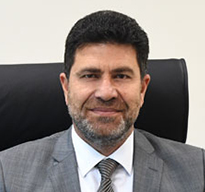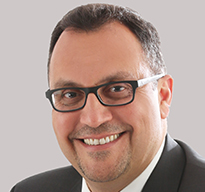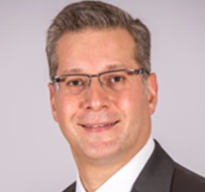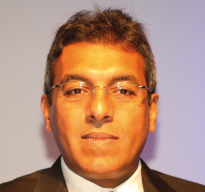Agenda | All times are GMT (UTC +0)
Wednesday, September 02
Welcome Remarks

Shauna Noonan
Occidental Petroleum
SPE President 2020
Opening Remarks

Raymond Ghajar
Minister of Energy and Water, Lebanon
There are growing opinions suggesting that the global Covid-19 pandemic will hasten the demise of fossil fuels. However, the prospect towards a predominantly renewable energy based world does not seem to be soon accomplished. Energy outlooks for the upcoming 20 to 30 years project a strong growth in renewables to becoming the largest source of power during that timeframe. Though, there is near consensus that demand for natural gas will robustly grow supported by its prevalent availability, the continuing expansion of LNG, and the relative cleanness of natural gas compared to other fossil fuels as well as being the raw material for clean hydrogen.
In this session, panelists will shine a light on the energy transition from conventional fuels to renewables and the expected contribution of natural gas through that journey.
Speaker(s):

Demetris Fessas
Acting General Manager
Cyprus Hydrocarbons Company

Zeinoun Klink
Vice President
Halliburton
Nathan Meehan
President
CMG Petroleum Consulting
Multiple prospects with significant petroleum potential are identified in offshore Lebanon. Yet, the associated geological risks are poorly understood, since petroleum system elements are different from those of closest discoveries. This session is dedicated to the methods and studies that help towards better understanding the risks, and to increase the chances of exploration success, including but not limited to:
- Advanced seismic processing methods that improve the imaging of complex trap geometry in pre-salt interval and enables highlighting subtle sedimentary features to detect DHIs, and distinguish them from artifacts.
- Paleogeography, sedimentology, outcrop studies, seismic attribute analysis, and other interpretation techniques aiming to predict reservoir presence and distribution.
- Tectonics and fault analysis, which help determining the age of key structural elements and estimating seal integrity in a basin where gas chimneys, pockmarks, and other evidences of potential hydrocarbons leakage are abundant.
- Geochemistry and basin modelling to understand the timing of traps formation in relation to biogenic and thermogenic source rocks maturation, and to predict the migration and composition of hydrocarbons.
Successful exploration activities in the East Mediterranean during the last decade opened new prolific plays. The discoveries of Tamar (2009), Leviathan (2010), Tanin (2012), Karish (2013), and Aphrodite (2011) proved a prolific gas play in the tertiary turbidite sandstones of the South Levantine sub-basin. Another important play has been recognised recently by the biogenic gas discoveries in the Mesozoic and tertiary carbonates like Zohr (2015), Calypso (2018), Onesiphoros (2018), and Glaucus (2019). The exploration of the possible extension of these plays into the northern Levantine sub-basin constitutes a major challenge for the E&P industry. It is common practice to supplement subsurface datasets with information and concepts derived from basin and reservoir analogues. This aims to reduce uncertainties and improve success rates on new frontiers being explored.
Recently acquired seismic data offshore Lebanon led to the identification of promising prospects, yet many questions remain unanswered. The western and south-western portions of the Levant Basin were drilled with valuable measurements obtained from drilled wells. Data from such regional analogues along with other international ones are believed to play a major role in reducing uncertainties pertaining to geology and reservoir characteristics within the Lebanese un-drilled area. Lessons learned from regional and international analogues would significantly help to optimise well location selection and planning, and enhance the understanding of reservoir characteristics and various challenges.
Thursday, September 03
Conventional exploration is addressing increasingly challenging plays, more complex geological settings, deep targets, stratigraphic traps difficult to detect and increased operational difficulties due to deeper wells, more complex development solutions and stricter environmental constraints. The oil and gas industry is continuously evolving in order to face these new and increasing challenges while attempting, at the same time, to reduce the financial and HSE exposure and assure its profitability. Three main pillars to guarantee sustainable results are, development of new and more sophisticated technologies, improvement of the processes efficiency and, leverage on the lessons learned and experience gained.
The collaboration and joint effort of Academia, Service Companies and Operators is fundamental for the development of successful new technologies. Operators point out the main needs and objectives and trigger the collaboration with Academic Institutions and Research Centers of the Service Companies to develop new tools and new technological solutions. During the recent years, the upstream sector saw major efforts to achieve more efficient technological solutions in the areas of seismic acquisition, seismic imaging, operational geology, reservoir modelling, seismic monitoring of producing fields, to name just a few.
The oil and gas industry is applying both Digital Transformation and Big Data extensively to improve processes efficiency, reduce time and avoid efforts redundancy. One of the benefits of digital transformation is also an improvement in HSE. Big Data allows us to forecast events, monitor and react in a very short time to reduce the negative impact and consequences.
Experience and competencies remain among the core assets to guarantee sustainable results in hydrocarbon exploration. Operators involved in the Upstream Business persist in their efforts to ensure constant update of the database and training of young professionals to achieve business continuity.
Speaker(s):

Karim Badawi
Managing Director - Egypt and East Mediterranean
Schlumberger

Hani Elshahawi
Deepwater Digitalisation Lead and Formation Testing and Sampling Principal Technical Expert
Shell

Ivo Nuic
Managing Director - DTC 4.0
Baker Hughes
Drilling in deep and ultra-deep offshore water is associated with major challenges that include but are not limited to harsh weather conditions, distance to shore, and many other characteristics of deepwater environment that increase the risk profile of drilling operations. In addition, drilling of exploratory wells are similar with their associated uncertainties of downhole conditions in general, including uncertainties of the reservoir, pressure window, depleted zones and losses, wellbore stability with reactive shale zones, downhole dynamics among other hazards.
To ensure safe drilling of such wells, whether technically and economically feasible, it is critical that those risks and challenges are identified and adequately addressed during the planning and execution phases as well as the evaluation phase to support the build-up of the learning curve for future development.
With an average water depth of 1,500m, the Mediterranean sea is no exception to the above. Establishing the required measures to mitigate the identified risks; with appropriate technology and applying industry best practices, coupled with the highest quality and HSE standards for execution; will support the optimisation and efficiency of operations and bring us closer to Lebanese offshore drilling success.
In this session, we will cover a wide spectrum of topics related to deepwater operations and drilling exploration well challenges, applicable technologies, lessons learned, and industry best practices.
With Lebanon approaching the drilling stage, it is important to learn and share ideas, case studies and best practices on the HSSE aspect of the drilling and operation from the region and from the offshore operations around the world.
- Explore and assess drilling and operations safety standards and codes of practice of other organisations, regulatory agencies, and legislative bodies and identify those that will have significant impact on and value added to the drilling operations
- Learn techniques to identify hazards in drilling operations and take specific actions to prevent incidents and related costs
- Share methodologies and skills to develop and implement a proactive and preventive safety plan for drilling operations
Review real-life case studies and share lessons learned which help to minimise incidents and prevent injuries and maximise the effectiveness of the safety initiatives.
Friday, September 04
There is no doubt that the recent acceleration in adopting new information and computing technologies has impacted the E&P business landscape. However, the oil and gas industry still has a lot of work to catch up on this global digital transformation.
Organisations in the industry have been putting significant efforts in adopting new technologies (IoT, AI, big data, and block chain to name few); however, these efforts are yet to be translated into real value-added opportunities. Are we going as an industry at the right speed of digital transformation to harvest the benefit or are we falling behind because of our legacy systems and tight regulations.
The SPE community, industry experts, and technology enthusiasts will shed some light on the challenges and opportunities of the digital transformation in the industry with a special focus on deep and ultra-deep gas field exploration and development. This session will enable presenter to share ideas or potentially combine efforts to explore new collaboration opportunities to add value to the emerging offshore Lebanon developments.
As Lebanon continues to explore and evaluate its offshore price, careful consideration and decisions have to be made regarding full life-of-field subsea and surface development. The value of the price along with market dynamics will define the economic boundaries for field development—those limits could be maintained or stretched with project planning and execution. While offshore exploration and development in Lebanon is in its infancy, the pivotal determinants for success are operator, service, and supplier collaboration along with implementation of proven best practices and deployment of step-change technology. In this session, we will invite presenters to address the challenges facing deepwater gas developments, discuss current industry best practices, and propose how new technologies can unlock the monetisation of these discoveries. Beyond the discussion of both deepwater subsea and surface production infrastructure, this session will also encourage the discussion of new approaches to the oil and gas project lifecycle, with integrated, fast-track field developments becoming more prevalent.
